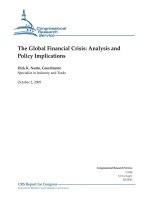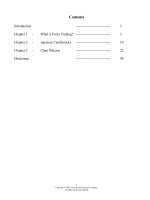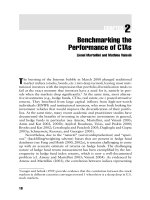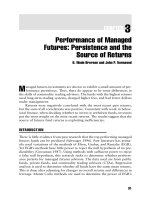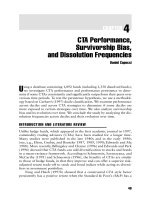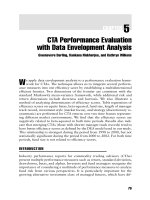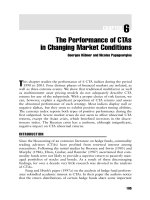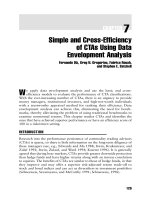Inseider trading global development and analysis
Bạn đang xem bản rút gọn của tài liệu. Xem và tải ngay bản đầy đủ của tài liệu tại đây (3.8 MB, 456 trang )
INSIDER TRADING
Global Developments and Analysis
INSIDER TRADING
Global Developments and Analysis
Edited by
Paul U. Ali
Greg N. Gregoriou
CRC Press
Taylor & Francis Group
6000 Broken Sound Parkway NW, Suite 300
Boca Raton, FL 33487-2742
© 2009 by Taylor & Francis Group, LLC
CRC Press is an imprint of Taylor & Francis Group, an Informa business
No claim to original U.S. Government works
Printed in the United States of America on acid-free paper
10 9 8 7 6 5 4 3 2 1
International Standard Book Number-13: 978-1-4200-7401-7 (Hardcover)
This book contains information obtained from authentic and highly regarded sources. Reasonable
efforts have been made to publish reliable data and information, but the author and publisher cannot assume responsibility for the validity of all materials or the consequences of their use. The
authors and publishers have attempted to trace the copyright holders of all material reproduced
in this publication and apologize to copyright holders if permission to publish in this form has not
been obtained. If any copyright material has not been acknowledged please write and let us know so
we may rectify in any future reprint.
Except as permitted under U.S. Copyright Law, no part of this book may be reprinted, reproduced,
transmitted, or utilized in any form by any electronic, mechanical, or other means, now known or
hereafter invented, including photocopying, microfilming, and recording, or in any information
storage or retrieval system, without written permission from the publishers.
For permission to photocopy or use material electronically from this work, please access www.copyright.com ( or contact the Copyright Clearance Center, Inc. (CCC), 222
Rosewood Drive, Danvers, MA 01923, 978-750-8400. CCC is a not-for-profit organization that provides licenses and registration for a variety of users. For organizations that have been granted a
photocopy license by the CCC, a separate system of payment has been arranged.
Trademark Notice: Product or corporate names may be trademarks or registered trademarks, and
are used only for identification and explanation without intent to infringe.
Library of Congress Cataloging-in-Publication Data
Ali, Paul U.
Insider trading : global developments and analysis / Paul U. Ali and Greg N.
Gregoriou.
p. cm.
Includes bibliographical references and index.
ISBN 978-1-4200-7401-7 (alk. paper)
1. Insider trading in securities. I. Gregoriou, Greg N., 1956- II. Title.
HG4551.A5847 2008
332.64--dc22
Visit the Taylor & Francis Web site at
and the CRC Press Web site at
2008005100
Contents
Introduction, ix
About the Editors, xiii
Contributors, xv
About the Contributors, xix
Acknowledgments, xxix
Part 1
1
The Taxonomy of Insider Trading
Market Inefficiencies and Inequities of Insider
Trading—An Economic Analysis
3
Colin Read
2
Securities Fraud and Its Enforcement: The Case
of Martha Stewart
13
Geraldine Szott Moohr
3
An Economic and Ethical Look at Insider
Trading
35
Robert W. McGee
4
Martha Stewart: Insider Trader?
49
Joan MacLeod Heminway
5
Insider Trading Regulation in Transition
Economies
67
Robert W. McGee
v
vi < Contents
6
Credit Derivatives and Inside Information
89
Paul U. Ali
Part 2
7
Regulating Insider Trading
A. Illegal Insider Trading
Inside Information and the European Market
Abuse Directive (2003/6)
99
Blanaid Clarke
8
Insider Trading in Australia
129
Anna-Athanasia Dervenis
9
The Evolution of Insider Trading Regulations in
Japan
143
Sadakazu Osaki
10
Insider Trading in China
157
Zhihui Liu and Margaret Wang
11
Hedge Fund Fraud
167
Greg N. Gregoriou and William Kelting
12
Extraterritorial Reach of the Insider Trading
Regimes in Australia and the United States
177
Yee Ben Chaung
13
An Investigation of the Whistleblower–
Insider Trading Connection: Evaluation and
Recommendations
Edward J. Lusk and Michael Halperin
209
Contents < vii
Part 2
14
Regulating Insider Trading
B. Legal Insider Trading
A Middle Ground Position in the Insider
Trading Debate: Deregulate the Sell Side
225
Thomas A. Lambert
15
Positive and Negative Information—Insider
Trading Rethought
245
Kristoffel R. Grechenig
Part 3
16
Economic Consequences of Insider Trading
The Economic and Financial Features of Insider
Trading
263
François-Éric R acicot and R aymond Théoret
17
Insider Trading, News Releases, and Ownership
Concentration
279
Jana Fidrmuc, Marc Goergen, and Luc Renneboog
18
Incentives to Acquire Information
341
Philippe Grégoire
19
Insider Trading in Emerging Stock Markets: The
Case of Brazil
369
Otavio Ribeiro de Medeiros
20
Legal Insider Trading and Stock Market
Reaction: Evidence from the Netherlands
385
Nihat Aktas, Eric de Bodt, Ilham Riachi, and Jan de Smedt
Index
403
Introduction
Insider trading—the illegal use of price-sensitive, nonpublic information
to buy and sell securities and other financial instruments—has long been
considered an endemic feature of the world’s financial markets, despite the
almost-universal criminalization of insider trading. It is thus unsurprising that the recent boom in mergers and acquisitions has been accompanied by a resurgence in insider trading and a concomitant increase in the
prosecution of insider trading on a scale not seen since the 1980s (Drummond 2007; Economist 2007).
The U.S. Securities and Exchange Commission (SEC), for instance,
has made clear that it views prosecuting insider trading a priority and
has recently devoted considerably more resources to monitoring suspicious trading in securities and security-linked derivatives. SEC Chairman
Christopher Cox, in his testimony to the U.S. Congress in early 2007, identified insider trading as one of three major risks affecting the U.S. capital
markets (SEC 2007b).
This new focus on insider trading is well illustrated by three major
insider trading–related lawsuits brought by the SEC during 2007. In
March 2007, the SEC charged fourteen persons, including three hedge
funds, with illegally trading shares using information stolen from two
investment banks (SEC 2007a). Then, in May 2007, the SEC charged a New
York–based investment banker with illegally providing inside information to an accomplice in Pakistan who purchased call options over TXU
Corp shares ahead of the buyout of TXU Corp by KKR and Texas Pacific
(SEC 2007c). Also, in May 2007, the SEC charged a Hong Kong couple
with illegally trading Dow Jones shares ahead of the announcement of
New Corp’s takeover offer for Dow Jones (2007d).
The prohibition of insider trading and the imposition of criminal penalties for insider trading have a moral dimension. One of the key justifications
for this response to insider trading is that it is “unfair” or even “immoral” for
ix
x < Introduction
securities to be traded (in a public market) when one party has private information which, if it were publicly available, would or would be reasonably
expected to affect the price of the securities and other parties in the market
are ignorant of that information. Thus, insider trading, if unchecked, would
lead to an erosion of confidence in the market and the exit of investors from
the market with adverse consequences for the cost of capital. Yet the concept of “unfair” trading alone cannot be a sufficient basis for prohibiting
insider trading, for a better-informed investor could always be said to have
an advantage—and arguably an unfair advantage—over less-well-informed
investors (Leland 1992). The logical extrapolation of this unfairness argument would be to ban all trading using private information.
The economic dimension, however, of insider trading is also murky and
is, likewise, a less than satisfactory basis for prohibiting insider trading.
Insider trading may reduce market liquidity, cause a widening of spreads,
and increase market volatility (Leland 1992; Du and Wei 2004; Cheng et
al. 2006) and also reduce the returns to outsiders since they are trading
against better-informed insiders (Leland 1992). However, it is equally possible that insider trading may facilitate price discovery, leading to more
informative security prices (Cornell and Sirri 1992; Meulbroek 1992;
Bhattacharya and Nicodano 2001) and, consequently, reduce the risks of
investing in securities for outsiders (Leland 1992). Nonetheless, the economic consequences of insider trading appear to be on a more defensible
footing than unfairness for prohibiting insider trading, especially if the
presence of insiders deters outsiders from trading, thus impeding price
discovery (Fishman and Hagerty 1992), and if insider trading does not
differentially affect the prices of securities compared to outsider trading
(Chakravarty and McConnell 1999).
Having said this, it is an ineluctable fact of life in most financial markets that insider trading is a criminal offense. The criminalization, however, of insider trading has not served to reduce the incidence of insider
trading (Seyhun 1992). Moreover, what evidence there is suggests that
insider trading prohibitions have in fact made insider trading more profitable (Bris 2005).
One might, on this basis, be forced to adopt the uncomfortable conclusion that the criminalization of insider trading has less to do with deterring economically damaging conduct and more to do with placating public
resentment about insider trading, namely, “the resentment by the investment public that other persons have the good fortune to enjoy something
to which the public has no right” (Schroeder 2005, 2027). This particular
Introduction < xi
point is well explored in a separate volume by one of the contributors to
this book (Heminway 2007).
This book brings together some of the latest research on insider trading,
covering established U.S., European, and Australasian markets as well as
the key emerging markets of Brazil and China. The book combines a variety of approaches toward the study of insider trading, with the contributors
coming from the fields of accounting, economics, finance, and law. The
book is divided into three parts. Part 1 (Chapters 1 to 6) broadly examines
the ethics of insider trading and the rationale for criminalizing insider
trading. Part 1 also examines insider trading in the context of emerging
markets and the new market for credit derivatives. Part 2 (Chapters 7 to
15) is concerned with regulatory responses to insider trading, including
the controversial topic of legal insider trading and whether the regulatory
response to insider trading should differentiate between positive and negative information and price-increasing and price-decreasing insider trading. Part 3 (Chapters 16 to 20) investigates the economic consequences
of insider trading, including market responses to insider trading and the
impact of insider trading on equity returns.
—Paul U. Ali and Greg N. Gregoriou
References
Bhattacharya, S., and G. Nicodano. 2001. Insider trading, investment, and liquidity: A welfare analysis. Journal of Finance 56(3):1141–56.
Bris, A. 2005. Do insider trading laws work? European Financial Management
11(3):267–312.
Chakravarty, S., and J. J. McConnell. 1999. Does insider trading really move stock
prices? Journal of Financial and Quantitative Analysis 34(2):191–209.
Cheng, L., M. Firth, T. Y. Leung, and O. Rui. 2006. The effects of insider trading
on liquidity. Pacific Basin Finance Journal 14:467–83.
Cornell, B., and E. R. Sirri. 1992. The reaction of investors and stock prices to
insider trading. Journal of Finance 47(3):1031–59.
Drummond, B. 2007. Insider trading. Bloomberg Markets, August.
Du, J., and S. J. Wei. 2004. Does insider trading raise market volatility? Economic
Journal 114:916–42.
Economist. 2007. When greed is bad. May 10.
Fishman, M. J., and K. M. Hagerty. 1992. Insider trading and the efficiency of
stock prices. RAND Journal of Economics 23(1):106–22.
Heminway, J. M. 2007. Martha Stewart’s legal troubles. Durham, NC: Carolina
Academic Press.
Leland, H. E. 1992. Insider trading: Should it be prohibited? Journal of Political
Economy 100(4):859–87.
xii < Introduction
Meulbroek, L. K. 1992. An empirical analysis of illegal insider trading. Journal of
Finance 47(5):1661–99.
Schroeder, J. L. 2005. Envy and outsider trading: The case of Martha Stewart.
Cardozo Law Review 26:2023–78.
Securities and Exchange Commission. 2007a. SEC Charges 14 in Wall Street
insider trading ring, March 1.
Securities and Exchange Commission. 2007b. Testimony concerning fiscal 2008
appropriations request, March 27.
Securities and Exchange Commission. 2007c. Litigation release 20105, May 4.
Securities and Exchange Commission. 2007d. Litigation release 20106, May 8.
Seyhun, N. H. 1992. The effectiveness of the insider-trading sanctions. Journal of
Law and Economics 35(1):149–82.
About the Editors
Paul U. Ali is an associate professor in the Faculty of Law, University of
Melbourne, and a member of that Law Faculty’s Centre for Corporate Law
and Securities Regulation. Prior to becoming an academic, Paul was, for
several years, a finance lawyer in Sydney. Paul has published widely on
banking and finance law, corporate governance and institutional investment law, securitization law, and structured finance law. His most recent
publications include Secured Finance Transactions (London, 2007), Innovations in Securitisation (The Hague, 2006), and International Corporate
Governance after Sarbane–Oxley (Hoboken, NJ, 2006). In 2006, Paul was
appointed by the Australian Federal Attorney-General as a member of the
Personal Property Securities Review Consultative Group. Paul holds an
SJD degree from the University of Sydney.
Greg N. Gregoriou is professor of finance in the School of Business and
Economics at State University of New York (Plattsburgh). A native of
Montreal, Greg received his bachelor of arts in economics from Concordia
University in 1988. In 1991, he completed his MBA from UQAM (University of Quebec at Montreal), and graduate Diploma in Applied Management from McGill University. He then completed his PhD in finance at
UQAM in the joint doctoral PhD program in Montreal, which pools the
resources of Montreal’s universities (McGill University, Concordia, and
HEC Montreal). He specializes in hedge funds, funds of hedge funds,
and managed futures. He has published more than fifty academic articles
on hedge funds and managed futures in various peer-reviewed journals,
such as the Journal of Portfolio Management, Journal of Futures Markets,
European Journal of Operational Research, Annals of Operations Research,
and Computers and Operations Research, and has written twenty book
chapters. He is hedge fund editor and editorial board member for Journal
of Derivatives and Hedge Funds, a London-based academic journal and
xiii
xiv < About the Editors
also editorial board member of the Journal of Wealth Management and
the Journal of Risk and Financial Institutions. Since his arrival at SUNY
(Plattsburgh) in 2003, he has published 26 books with John Wiley & Sons,
Elsevier Butterworth-Heinemann, McGraw-Hill, Palgrave-Macmillan,
Bloomberg Press, and Risk Books.
Contributors
Nihat Aktas
Academic Fellow—Europlace
Institute of Finance
CORE & IAG Louvain School of
Management
Université catholique de Louvain
Louvain-la-Neuve, Belgium
Paul U. Ali
Faculty of Law
University of Melbourne
Melbourne, Australia
Yee Ben Chaung
Faculty of Law
University of Melbourne
Melbourne, Australia
Blanaid Clarke
Law School
University College Dublin
Dublin, Ireland
Eric de Bodt
Université de Lille 2
IAG Louvain School of
Management
Université catholique de Louvain
Louvain-la-Neuve, Belgium
Otavio R. de Medeiros
University of Brasilia
Campus Universitario Darcy
Ribeiro
Brasilia, Brazil
Jan de Smedt
Banking, Finance and Insurance
Commission (CBFA)
Brussels, Belgium
Anna-Athanasia Dervenis
Macquarie Bank
Sydney, Australia
Jana Fidrmuc
University of Warwick
Coventry, West Midlands, England
Marc Goergen
University of Sheffield
Management School
Sheffield, United Kingdom
Kristoffel R. Grechenig
University of St. Gallen
St. Gallen, Switzerland
xv
xvi < Contributors
Philippe Grégoire
Département de finance et
assurance
Faculté des sciences de
l’administration
Université Laval
Quebec City, Quebec, Canada
Greg N. Gregoriou
School of Business and Economics
State University of New York,
Plattsburgh
Plattsburgh, New York
Michael Halperin
Lippincott Library
Wharton School
University of Pennsylvania
Philadelphia, Pennsylvania
Joan MacLeod Heminway
The University of Tennessee
College of Law
Knoxville, Tennessee
William Kelting
Professor of Accounting
School of Business and Economics
State University of New York,
Plattsburgh
Plattsburgh, New York
Thomas A. Lambert
University of Missouri School of
Law
Columbia, Missouri
Zhihui Liu
Faculty of Law
Chinese University of Political
Science and Law
Beijing, China
Edward J. Lusk
School of Business and Economics
State University of New York,
Plattsburgh
Plattsburgh, New York
Robert W. McGee
Director, Center for Accounting,
Auditing and Tax Studies
School of Accounting
College of Business
Administration
Florida International University
Miami, Florida
Geraldine Szott Moohr
University of Houston Law Center
Houston, Texas
Sadakazu Osaki
Nomura Institute of Capital
Markets Research
Tokyo, Japan
François-Éric Racicot
Department of Administrative
Sciences
University of Quebec at Montreal
Montreal, Quebec, Canada
Contributors < xvii
Colin Read
School of Business and Economics
State University of New York,
Plattsburgh
Plattsburgh, New York
Raymond Théoret
Department of Administrative
Sciences
University of Quebec at Montreal
Montreal, Quebec, Canada
Luc Renneboog
Tilburg University
Tilburg, The Netherlands
Margaret Wang
Chambers & Co
Melbourne, Australia
Ilham Riachi
IAG Louvain School of
Management
Université catholique de Louvain
Louvain-la-Neuve, Belgium
About the Contributors
Nihat Aktas is associate professor of finance at the IAG Louvain School of
Management, Universite Catholique de Louvain and Academic Fellow of
the Europlace Institute of Finance.
Yee Ben Chaung works in Melbourne for one of Australia’s leading
national law firms. He holds degrees in commerce and in law from the
University of Melbourne, and is currently undertaking postgraduate studies in law at the University of Melbourne.
Blanaid Clarke, BCL, MBS (Banking & Finance), Barrister at Law, PhD, is
associate professor in corporate law in the Law School, University College
Dublin (UCD). Blanaid is one of the founding members of the Institute
of Directors’ Centre for Corporate Governance at UCD, a member of the
Irish Takeover Panel Executive, and Academic Director for the Business
and Legal Studies Degree in UCD. In Spring 2006, Blanaid was Visiting
Scholar to the University of Queensland and Parsons Visitor to the University of Sydney. Blanaid has published several texts including Contract
Cases and Materials (coauthored with R. Clark, 3rd ed. Dublin: Gill &
Macmillan; 2004) and Takeovers and Mergers Law in Ireland (Dublin:
Roundhall Sweet & Maxwell; 1999). She has produced numerous articles including most recently “Articles 9 and 11 of the Takeover Directive
(2004/25) and the Market for Corporate Control.” Journal of Business Law
(UK) (2006): 355–74.
Eric de Bodt is professor of finance at Université de Lille 2 and at the IAG
Louvain School of Management, Universite Catholique de Louvain.
xix
xx < About the Contributors
Otavio Ribeiro de Medeiros was born in Rio de Janeiro. He started his
academic career with a university degree in mechanical engineering from
Pontifícia Universidade Católica in Rio. After some time, he studied for an
MSc in administration with a major in finance at the COPPEAD Institute
in Rio. Later on, he moved to the United Kingdom where he received an
MSc in economics from Birkbeck College–University of London, and a
PhD in economics from the University of Southampton. He worked as a
financial executive for a number of large Brazilian companies such as Furnas, BNDES, AD-Rio, Aços Villares, and Etesco. After joining academia in
2002, he is currently full professor of finance at the University of Brasilia,
Brazil, teaching in the graduate programs of administration and accounting in that institution. He is also a research fellow of CNPq–National
Counsel of Technological and Scientific Development (Brazil). He has
written a number of articles and research papers, and his research interests include stock markets, corporate finance, and applied econometrics.
Jan de Smedt is administrative secretary with the Banking, Finance and
Insurance Commission (CBFA), Belgium.
Anna-Athanasia Dervenis is a lawyer with the Macquarie Bank Limited
Banking and Property Group, Sydney. Anna specializes in corporate and
property law within the Real Estate Capital division. She holds degrees in
commerce (finance) and in law from the University of New South Wales
and was admitted as a solicitor of the Supreme Court of New South Wales
in 2006.
Jana Fidrmuc is a graduate of the University of Bratislava with an MSc in
physics and of the University of Tilburg with an MSc and PhD in financial
economics. She held a post-doc position at Erasmus University in Rotterdam
and joined the University of Warwick as a lecturer in finance in 2005. She
has published on insider trading in the Journal of Finance, and on transition
economics in the Journal of International Money and Finance and in the
Economics of Transition. Her research interests are corporate governance,
corporate finance, ownership structure, and restructuring in transition.
Marc Goergen has a degree in economics from the Free University of
Brussels, an MBA from Solvay Business School, and a DPhil from the
University of Oxford. He has held appointments at the University of Manchester Institute of Science & Technology (UMIST), Manchester Business
About the Contributors < xxi
School, and the ISMA Centre (University of Reading). He currently holds
a chair in finance at the University of Sheffield Management School. Marc
Goergen’s research interests are in corporate ownership and control, corporate governance, mergers and acquisitions, dividend policy, corporate
investment models, insider trading, and initial public offerings. Marc has
widely published in academic journals such as European Financial Management, Journal of Business Finance & Accounting, Journal of Corporate
Finance, Journal of Finance, and Journal of Law & Economics. He has also
contributed chapters to several edited books and written two books on
corporate governance (published by Edward Elgar and Oxford University
Press). Marc is a research associate of the European Corporate Governance Institute and a fellow of the International Institute for Corporate
Governance & Accountability.
Kristoffel R. Grechenig received both his first law degree (Magister) and
his second law degree (Doktor) from Vienna University School of Law.
He wrote his doctoral thesis on Spanish corporate law in comparison to
German and Austrian corporate law and was awarded the Walther-Kastner-Prize and the IVA Stipendien Prize. He enrolled for a postgraduate
study at Columbia Law School and received his LLM degree as a Harlan
Fiske Stone Scholar. He started working as an assistant professor of law at
the Vienna University of Economics and Business Administration, focusing on comparative corporate law. He was a fellow at the FOWI Institute
(Institute for Eastern European Business Law) and a clerk at the Austrian
Court for Commercial Law. He currently holds the position of Post-Doc
Assistant Professor of Law at the Vienna University of Economics and
Business Administration, where his main fields of research include comparative corporate law, law and economics, and comparative legal theory.
He has published numerous articles on these topics in English, German,
and Spanish. He currently teaches a corporate law and economics course
at his university and a comparative legal theory course at the Vienna University School of Law.
Philippe Grégoire is a professor in the Faculty of Business Administration, Laval University, Quebec.
Michael Halperin is director of the Lippincott Library of the Wharton
School of the University of Pennsylvania. He is an information retrieval
expert who has given numerous seminars on the creation of information
xxii < About the Contributors
from the EDT linkages available in the nexus of Compustat and CRSP.
Further, he has developed numerous workshops on the search retrieval of
text information using ABI-Inform and Business Source Premier.
Joan MacLeod Heminway regularly teaches business associations,
corporate finance, representing enterprises (a transaction simulation
course), and securities regulation in The University of Tennessee (UT)
College of Law James L. Clayton Center for Entrepreneurial Law. She
received the University Chancellor’s Award for Teaching Excellence in
2006, the college’s Marilyn V. Yarbrough Faculty Award for Writing
Excellence for 2005, and the college’s Harold C. Warner Outstanding
Teacher Award for 2004. Professor Heminway’s stock merger module for
the Representing Enterprises course was recognized by the UT Innovative Technology Center in its September 2002 Best Practices@UT Showcase. She was Visiting Professor at Boston College Law School for the Fall
2005 semester, where she taught mergers & acquisitions and securities
regulation, and is visiting at Vanderbilt University Law School to teach a
short course on Animals & the Law for the Spring 2007 semester. Professor Heminway edited and contributed to a recently released book, Martha Stewart’s Legal Troubles, that includes chapters focusing on the white
collar crime, securities regulation, and corporate law aspects of Martha
Stewart’s recent legal entanglements. Her research agenda principally
focuses on securities disclosure law and policy, with a special focus on
insider trading regulation. Recent articles authored by Professor Heminway have appeared in (among other publications) the American University Law Review, University of Cincinnati Law Review, Fordham Journal
of Corporate & Financial Law, Maryland Law Review, and Texas Journal
of Women and the Law. Before starting her teaching career in 2000, Professor Heminway spent fifteen years practicing law in the Boston office
of Skadden, Arps, Slate, Meagher & Flom LLP, where she specialized in
mergers and acquisitions and securities regulation matters. Leveraging
off this experience, Professor Heminway has coauthored (with several
Tennessee practitioners) a series of annotated merger and acquisitions
agreements that have been published in the Spring 2003, 2004, 2005,
and 2006 issues of Transactions: The Tennessee Journal of Business Law
( />A
new article in this series has been published in the Spring 2007 issue of
Transactions.
About the Contributors < xxiii
William R. Kelting is emeritus professor of accounting, State University
of New York, Plattsburgh. He has been teaching for almost 40 years at
the institution. Before joining the college, he worked for several accounting firms including Arthur Andersen, and Telling, Kelting, & Potter,
CA (Founding partner). Dr. Kelting earned his BA in economics from
Washington & Lee University, and his MBA in public administration
from Rutgers University, and a PhD in accounting with minors in economics and psychology from University of Arkansas (1988). He is also a
CPA. Dr. Kelting’s research has appeared in refereed journals. Recently,
his articles appeared in The Accounting Educator’s Journal, Journal of
Financial Crime, and Pension: An International Journal. Dr. Kelting also
coauthored a computerized case study in governmental accounting and a
study guide for a major textbook in auditing. In addition, Dr. Kelting has
several publications in professional journals and has made several presentations at academic and professional organizations. He is a member of the
American Institute of Certified Public Accountants, Association of Certified Fraud Examiners, and the New York State Society of Certified Public
Accountants.
Thomas A. Lambert, associate professor of law at the University of Missouri, graduated with highest honors from Wheaton College (Illinois). He
then worked as an environmental policy analyst at the Center for the Study
of American Business at Washington University in St. Louis before attending the University of Chicago Law School. While at Chicago, Lambert was
a Bradley Fellow and served as comment editor of the Law Review. After
graduating with honors in 1998, he clerked for Judge Jerry E. Smith of the
U.S. Court of Appeals for the Fifth Circuit and spent a year as the John
M. Olin Fellow at Northwestern University Law School. He then joined
the Chicago office of Sidley Austin LLP, where he practiced antitrust and
securities litigation. In 2003, he joined the law faculty at Missouri, where
he teaches business organizations, contracts, antitrust law, and environmental law. Lambert has published numerous scholarly articles on regulatory theory and business law topics. In addition, he is a member of
the advisory board of the eSapience Center for Competition Policy and a
regular contributor to Truth on the Market (www.truthonthemarket.com),
a weblog devoted to “academic commentary on law, business, economics,
and more.”
xxiv < About the Contributors
Zhihui Liu is associate professor of Faculty of Law and an associate director of Civil Law Institute, at China University of Political Science and Law
in Beijing, China. She specializes in civil and commercial law and has
published extensively in these areas. Her latest publications include Comments on Complex Issues Relating to China’s new Property Law, published
by Jiangsu People’s Press, and Fundamental Principles of Possessory System, published by Renmin University Press.
Edward J. Lusk is currently professor of accounting, the State University of New York, College of Economics and Business, Plattsburgh, New
York, and Emeritus: The Department of Statistics, The Wharton School,
The University of Pennsylvania, Philadelphia, Pennsylvania. From 2001
to 2006 he held the Chair in Business Administration at the Otto-vonGuericke University, Magdeburg Germany. He has also taught in China at
the Shanxi University of Finance and Commerce and the Chulalongkorn
University Bangkok, Thailand. He as published more than 145 articles in
peer-reviewed journals including The Journal of Political Economy, Statistics and Probability, The Accounting Review, Management Science, The
Journal of the Operational Research Society, Gender, Work and Organizations, and Decision Support Systems.
Robert W. McGee is an accounting professor at Florida International
University in Miami, Florida. He has published more than 400 articles
and more than 50 books in the areas of accounting, taxation, economics,
law, and philosophy. His experience includes consulting with the governments of several former Soviet, East European, Asian, African, and Latin
American countries to reform their accounting and economic systems.
Dr. McGee is an attorney, certified public accountant, and economist and
holds doctorates in several fields, including accounting, economics, law,
and philosophy. The Journal of Business Ethics ranked him number 1 in
the world for business ethics scholarship. The Social Science Research Network ranks him in the top one-tenth of 1 percent in terms of downloads
from its Web site, out of more than 83,000 academics worldwide.
Geraldine Szott Moohr joined the University of Houston Law Center as
an associate professor of law in 1995. In 2001, she was awarded a George
Butler Research Chair, a rotating professorship honoring excellence in
scholarship and in 2005 she was awarded the Alumnae Law Center Chair.
Professor Moohr has held visiting appointments at the Washington and

